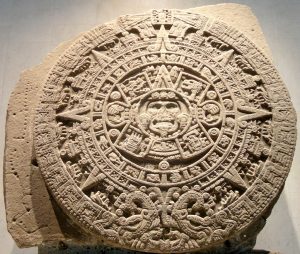
The Mayan Calendar Stone, or Sun Stone, at the National Anthropology Museum in Mexico City (source: Wikipedia)
There’s a widely held belief that money decreases in value over time, so that a dollar in hand today is worth more than a dollar received tomorrow or some other time in the future. But is this necessarily the case, and what does this practice say about the value we place on time itself?
As rapid advances in science and technology make the future course of time less predictable than it once was, these questions are perhaps worth some discussion. Could the future worth more than the present?
Many business decisions are based on the belief that the passage of time poses risk and diminishes the value of money. The assumed decrease is recorded in financial accounts by discounting future cash flows, in what we call the “time value of money”. The discount is often based on current interest rates or some other historic measure of “opportunity cost” reflecting other ways the money could be put to use if it was available in the present. Implicit in this belief is that time itself has value, since money itself has no intrinsic value beyond the belief that we place in it as a medium of exchange.
What is difficult to measure is the potential that the future could provide better opportunities than currently exist, either for spending or for investment. Can a case be made that putting off spending or investment now and deferring it to the future could generate greater returns than if that dollar were available for use today?
In recent decades we have seen many technological innovations that produce great efficiencies and value through automation, new means of communication, and new industries previously unimagined. Twenty years ago who would have foreseen the rapid advances in solar energy technology and decreased cost of implementation that we are now enjoying? Who would have predicted that more than half the world’s population would now be walking around with hand-held computers capable of searching a global database and streaming the latest movies?
After the global economic crisis of 2008, triggered by high-risk lending that created a bubble in housing prices, risk-averse investors steered clear of putting money in then-new electric vehicle technology – but who then could have imagined the world of today with the rapid increase in electric vehicle sales and major car manufacturers pledging no further fossil fuel-burning vehicles within the next 10-15 years? An investment in industries relying on fossil fuels might have looked like a solid bet in 2009, but seems far less so now as widespread concern for the environment and climate change has caused governments across the globe to take actions limiting fossil fuels and expanding green technology. Who knows where the future is headed and what value we can place on it?
If the value of anything is the belief that we place in it, what belief do we hold in the future and what value do we give the time to come?
Imagine the possibilities that could emerge in time if, for example, any of the following were to occur:
- Space exploration reveals a means to unify general relativity with quantum mechanics: The potential for new discoveries in space has multiplied with the recently-launched powerful James Webb Telescope, space probes that can land on comets, the efficiencies of reusable rockets, the first-ever imaging of a black hole, and detectors like LIGO that can measure minute fluctuations in the very fabric of spacetime. Are we about to discover the elusive nature of gravity and the grand unification theory of physics, and what opportunities would that create for education, for work in science, for industry, and for all imaginable potential?
- The quantum computer is perfected and replaces existing binary computers: It is a commonly-held belief that the quantum computer, which promises potentially infinite speed applying a process known as quantum superposition, will require another decade or two to develop for commercial and widespread use. That’s in part because of the physical challenges that the quantum computer presently faces with the limitations of the materials it uses to transmit signals. These limitations are currently very costly to overcome, typically requiring the machines to be super-cooled and completely insulated from the outside environment so that the signals do not lose their logic to interference. But what if a discovery a month from now revolutionizes our understanding of quantum mechanics and materials science, so that the quantum computer becomes available in two years instead of twenty? Have we made any provision for that possibility, knowing how suddenly change has come on us in the past? What processes that are already computerized would change, in what ways, and what opportunities would develop, when the quantum computer becomes commonplace? Thirty years ago a prominent technology industry leader predicted the internet would not amount to much, and yet look at where we are now with our daily existence almost inconceivable without the internet. It’s a precedent we should not forget.
- The financial and environmental cost of food production and distribution decreases rapidly: The production of food is currently extremely energy-intensive, particularly in the manufacture of fertilizers and electricity for greenhouses and cold storage, and the cost of delivering it can be prohibitive. Millions upon millions of people across the planet are starving, and all the value of their potential in time is being lost in the human tragedy. What if a means of producing food is developed using inexpensive and renewable resources, so that no one need starve again? What changes would this force on existing processes, and what industries would flourish when the millions now dying are able to live?
The question about the value of time, and its potential that changes so quickly now with advances in science and technology, seems to be increasingly relevant. Is the greatest value in time in the present, as current economic practices assume, or is the immeasurably greater value in the future? What does history tell us about the trends in time’s value, and where should we place our bets when no one can predict outcomes in time because all of us have a hand in producing the results?
So what is the value of time? Nobody knows, because the future is unpredictable. If anything, the value of time is in the belief that we place in the future, and belief is a variable thing. If we believe the future will pose significant risks by war, overpopulation, climate disasters, or other losses then the value of time will decrease in time to nothing. If, on the other hand, we imagine a brighter future, free of the division and discord that now divides us and enabled by peaceful technology that reduces starvation and poverty in the advancement of science, who can say that the value of time is anything other than unlimited?



